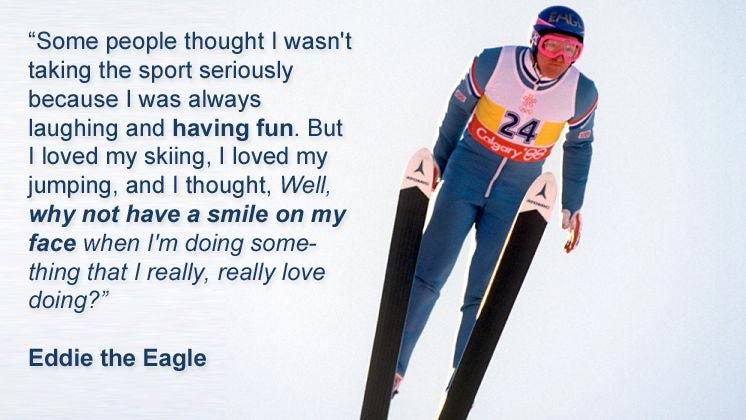What Does ‘To Write with Wild Abandon’ Mean?
Ski jumping is not something you can take up casually.
I live in a city that was for years one of the training facilities for the Canadian Ski Jumping Team, and I’ve seen what these jumpers do. In fact, I’ve seen Eddie the Eagle, perhaps the most famous ski jumper of all time, jump here sometime in the 90s.
It is crazy: you sit all safe and sound on a wooden beam at the top of a big ramp. And then you stand up. And then gravity and your skis whoosh you down to the end of that ramp. And you let them. And then at the very end, rather than gingerly try to step down from the ramp, you jump up as hard and as high and as far as you can. And you literally fly through the air using your skis as glider wings until you touch down at the bottom of the hill a hundred metres or 330 feet below.
At least, that’s the theory. Sometimes the physics dictate otherwise for disastrous results.
Like most sports, the best of the best start when they are very young – maybe four or five. But there is one big difference in this case. Whereas starting late in most sports dramatically reduces your chances of making it to the Olympics, starting late in ski jumping dramatically reduces your chances of making it to the bottom alive. It’s such an insane, counterintuitive activity for humans that most people only have a chance at it if they learn it early, like a language.
Eddie the Eagle though – he wanted to prove them all wrong. He started very late in life. And although never the best ski jumper in the world, he was crazy even compared to other, crazy ski jumpers. As anyone who has seen the movie about his life can tell you, his story is an amazing one of fearlessness and determination. Despite all the odds, he threw himself into his new sport and down that hill with wild abandon.
Wild Abandon
noun phrase
1. to launch yourself into an activity with little or no concern for consequences
What a delicious phrase that is: wild abandon.
In trying to come up with a name for this newsletter, I really had to dig to decide what it was I wanted to talk about. What was the theme? What did I want writers to take away from these posts.
What was my message?
There are so many blogs and books and workshops and manuals and university classes and so on about writing, what did I think I could offer? I’m not being facetious here. I truly wanted to find an aspect of writing that nobody else had talked about before – at least in-depth. That’s harder than you think. What I realized though was that although there is a lot of information out there on the mechanics of writing, there is little on the mental aspects – the psychology of writing. Now, I hesitate to use that word “psychology” because I’m not a psychologist. (As my psychologist wife will readily attest...)
But I do know something of facing that blank page. I know it from personal experience, and I know it from helping other writers overcome their own challenges.
The Dark Side of Writing Nobody Talks About
It’s like there is this dark side of writing that nobody talks about. We’ll wax poetic about plot and story and characters. We’ll even joke about doing the laundry instead of writing, and make it seem noble somehow to choose housework over writing. But we don’t address the very real mental challenges we face going on just under the surface. (I mean, seriously! How bad is it that we’re willing to do laundry instead writing? It’s so obvious that something truly twisted is going on here that needs to be cured.)
These afflictions don’t infect just beginner writers either. They haunt all writers. In my first post, One Small Step, I touched on the fact that even Neil Gaiman and Neil Armstrong have bouts of imposter syndrome. Some might find that daunting or depressing. You mean, I’m never going to get over this?
But I find it very freeing. Because (a) we writers all have this common bond of uncertainty, no matter where we are on the path to our writing goals, and (b) the two Neils prove that there’s obviously a way around imposter syndrome to become successful. No matter how humble you are, you don’t just accidentally find yourself being the first person to step on the moon.
Eddie the Eagle is proof of that, too. Here’s another quote of his that I love:
I made my dream come true despite all the obstacles – no money, no training, no
skis, no snow.
- Eddie the EagleThink about that! He made his Olympic ski jumping dream come true from literally nothing – not even snow. If you’re a writer and you have a pen and a piece of paper, you’re already miles ahead of Eddie.
But what Eddie had that many of us don’t (yet) is that sense of wild abandon. He went headlong trying to go as fast as he could to jump as high as he could to go as far as he could without breaking every bone in his body (as he could).
All we writers have to do is put a few words down on paper, and we can call it a day. When you look at it from that perspective, suddenly writing sounds a whole lot easier.
So What’s the Answer?
There are two answers to this post’s title, “What Does ‘To Write with Wild Abandon’ Mean?” In terms of this newsletter, it’s about tapping into that sense of wonder and fearlessness. Because really, if our writing falls flat, what are the consequences? We crumple it up, pull out another piece of paper, and start again. As Eddie will tell you, that’s nothing compared to the crumpling he felt when he fell flat.
In terms of what does it mean to write with wild abandon, the answer is a little more complex. Even if we’re not shooting down a 90-metre ramp, there are still some real obstacles writers have to overcome. Imposter syndrome mentioned above is one of them, but there are a ton of others like Writer’s Block, fear, and procrastination. I’ll be exploring all of our bugaboos and suggesting strategies for attacking the hill and flinging ourselves down a ramp and flying through the air without thinking about the consequences whatsoever.
Key Takeaway: To write with wild abandon, don’t think. Just write.
Fun Writing Exercise
Write 200 words on why peas are better than carrots. Or, if you disagree, why carrots are better than peas. Or, if you think broccoli is getting a (ahem) raw deal, argue its case instead. Or write about something completely different.
There’s only one rule: Don’t think. Just write.
Then come back and tell us how you did in the comments.
Until next time, keep writing with wild abandon!
~Graham
Here’s Eddie the Eagle going back to the hill years after he left it – still with wild abandon.



